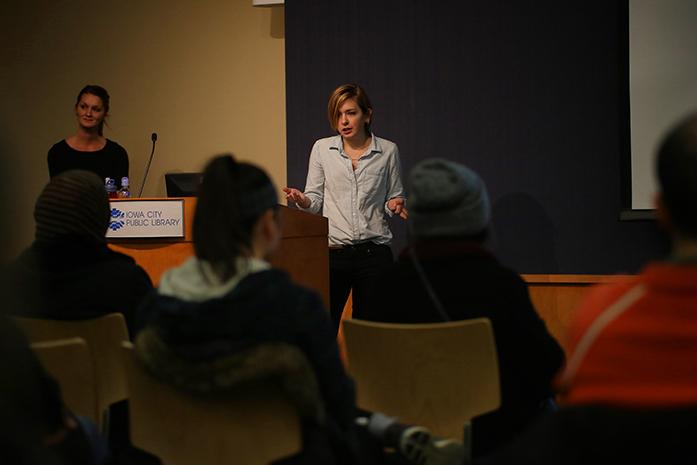By Kit Fitzgerald
President Trump’s executive order and other recent changes to immigration laws are not only alarming to some but confusing.
A group of six law students, acting independently from the university, organized an information and Q&A session updating the community on the current laws and policies for refugees and immigrants.
The information session covered several topics including visas, Iowa City policies, state policies versus federal policies, traveling, police involvement, Deferred Action for Childhood Arrivals, U.S. Immigration and Customs Enforcement, university involvement, and how to make an action plan.
The six speakers who organized and ran this event did so because they were concerned about the sudden changes in immigration laws as well as misinformation, said Jessica Donels, UI law student and event organizer.
“We wanted to hold an event that was open and safe where we could share our expertise to share that knowledge that is so badly needed,” Donels said. “There is so much misinformation about these executive orders, and especially for someone with uncertain status that can be very stressful and difficult to deal with.”
There was a responsibility to help inform people, said Katelynn McCollough, a UI law student and event organizer.
McCollough came up with the idea of the event and was the primary organizer, Donels said.
“I am a member of immigration clinic at the law school and also the co-president of the Iowa Student Bar Association, and I had emails coming into me from other schools and the university expressing interest,” McCollough said. “People were concerned and wanted answers.”
The students were responsible for the planning and idea creation, but had the help of law Clinical Associate Professor Bram Elias and Associate Professor Stella Elias, McCollough said.
“They wanted to use their knowledge to help examine the executive orders that were coming out and help make sure the information we were providing was thorough and up to date,” she said. “They were kind enough to be here tonight.”
The Eliases helped separately from the university and only helped with the information aspect, McCollough said. The rest was up to the students.
“The six of us worked together on what the content should be and how to reach both allies and people that might be affected by the orders,” Donels said. “We also had a resource table set up.”
The other resources provided, besides the information session and Q&A, included translators, two attorneys to give general information rather than legal advice, and handouts on classes for English as a second language, Donels said.
UI student Khalid Algublan said the event was helpful.
“I found it beneficial in a number of ways,” Algublan said. “First of all, I think it provided us with rich information, details about the executive [order], but also it was useful to find supporting group and resources.”
The group of students has no current plan for more events, but if things continue to change or if there are new executive orders, they will plan more events, McCollough said.
Donels and McCollough said they believed the event was a success.
Donels pointed out there were many people who attended that were not immigrants or were not directly affected by new immigration laws.
“Knowledge is important,” Donels said. “But it’s also important to know there are people in the community that care about you.”



